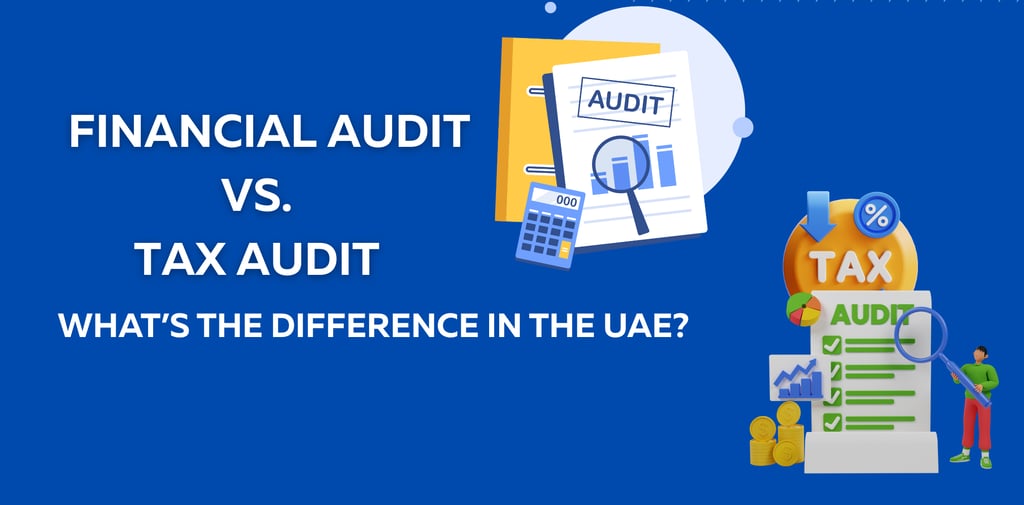Financial Audit vs. Tax Audit: What’s the Difference in the UAE?
Understand the key differences between financial audits and tax audits in the UAE to keep your business compliant and audit-ready
6/10/20252 min read


Financial Audit vs. Tax Audit: What’s the Difference in the UAE?
Understand the key differences between financial audits and tax audits in the UAE to keep your business compliant and audit-ready
In the UAE’s evolving regulatory environment, companies are expected to maintain high standards of financial transparency and compliance. Two critical processes that often get confused are financial audits and tax audits. Although they may sound similar, they serve different purposes and are conducted by different authorities.
Let’s break down the difference between a financial audit and a tax audit and why both are important for businesses operating in the UAE.
📊 What is a Financial Audit?
A financial audit is an independent assessment of a company’s financial records, usually conducted by a registered audit firm. The goal is to confirm whether the financial statements present a true and fair view of the company’s financial position.
In the UAE, especially in free zones such as DMCC, JAFZA, DAFZA, and others, financial audits are a mandatory annual requirement for license renewal.
Key features of a financial audit:
Conducted by a third-party, DMCC-approved auditor
Reviews the accuracy and consistency of financial statements
Helps identify internal control weaknesses
Often required by investors, lenders, or government authorities
🧾 What is a Tax Audit?
A tax audit is carried out by the Federal Tax Authority (FTA) to verify that a business is complying with VAT and Corporate Tax regulations. Unlike financial audits, tax audits are not scheduled by the business—they are initiated by the FTA and can happen with or without prior notice.
During a tax audit, the FTA reviews your:
VAT returns
Tax invoices and receipts
Accounting records
Tax submissions and supporting documents
Businesses may be selected for a tax audit based on risk assessments, inconsistencies in filings, or randomly as part of the FTA’s compliance checks.
🔍 Key Differences Between Financial and Tax Audits
While both audits involve reviewing financial records, their purpose, authority, and outcomes are different:
Purpose: A financial audit checks if your books are accurate and complete, while a tax audit ensures you’ve paid the correct amount of tax.
Authority: Financial audits are conducted by external, registered auditors; tax audits are conducted by the UAE’s FTA.
Timing: Financial audits are typically annual; tax audits can occur at any time, often without notice.
Outcome: A financial audit results in a formal audit report. A tax audit could result in penalties or tax reassessments if discrepancies are found.
🛡️ Why UAE Businesses Should Be Prepared for Both
Staying prepared for both financial and tax audits is essential to maintain your business reputation, ensure regulatory compliance, and avoid legal and financial consequences.
Being audit-ready helps you:
Renew your trade license without delays
Avoid penalties from the FTA
Build investor and stakeholder confidence
Maintain healthy financial and tax records
✅ How ALWAHAT ACCOUNTS AND INTERNAL AUDIT SERVICES Can Help
At ALWAHAT ACCOUNTS AND INTERNAL AUDIT SERVICES, we offer a full range of audit and compliance solutions, including:
DMCC and free zone-approved financial audits
VAT and Corporate Tax compliance checks
Internal audit and risk assessment services
FTA tax audit support and pre-audit reviews
Whether you need help with annual audits or preparing for a tax inspection, our team ensures your records are in order, up to date, and in full compliance with UAE laws.
📞 Book your FREE consultation today:
📱 +971 50 132 0705
📧 info@alwahataudit.com
🌐 www.alwahataudit.com
📌 Disclaimer:
This blog is intended for informational purposes only and does not constitute legal, tax, or financial advice. Please consult a licensed professional or refer to the relevant UAE regulatory authority for official guidance.
Address
Faisal 2 Bldg, Office No 203, King Faisal St, Al Nad- Al Qasimia, Sharjah, UAE
Level 17, World Trade Center, Khalifa Bin Zayed, the first street- Abudhabi
Unit 32 -
4th Floor, AWR Properties - Al Fahidi Heights Office Tower, beside Central Mall ,near Sharaf DG metro station exit 4,Dubai ,U.A.E
Contacts
info@alwahataudit.com
+971589373943
We empower you to make well-informed decisions and successfully attain your financial objectives.


All copyrights reserved @Al-Wahat Accounts & Internal Audits | Designed - Abhijith.digital
Subscribe to our newsletter


